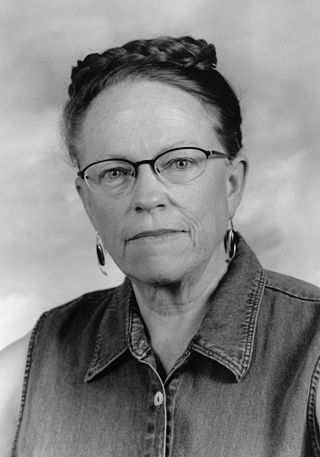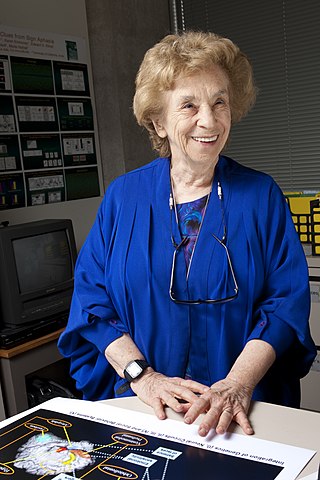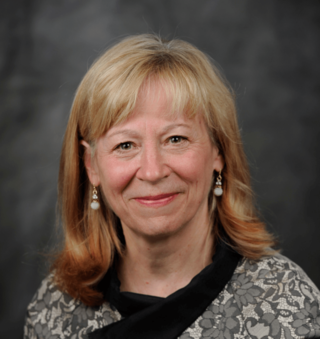Related Research Articles

Jane Shelby Richardson is an American biophysicist best known for developing the Richardson diagram, or ribbon diagram, a method of representing the 3D structure of proteins. Ribbon diagrams have become a standard representation of protein structures that has facilitated further investigation of protein structure and function globally. With interests in astronomy, math, physics, botany, and philosophy, Richardson took an unconventional route to establishing a science career. Today Richardson is a professor in biochemistry at Duke University.
Trudy Frances Charlene Mackay is the director of Clemson University's Center for Human Genetics located on the campus of the Greenwood (S.C.) Genetic Center. She is recognized as one of the world's leading authorities on the genetics of complex traits. Mackay is also the Self Family Chair in Human Genetics and Professor of Genetics and Biochemistry at Clemson University.

Susan Goldin-Meadow is the Beardsley Ruml Distinguished Service Professor in the Departments of Psychology, Comparative Human Development, the college, and the Committee on Education at the University of Chicago. She is the principal investigator of a 10-year program project grant, funded by the National Institute of Child Health and Human Development, designed to explore the impact of environmental and biological variation on language growth. She is also a co-PI of the Spatial Intelligence and Learning Center (SILC), one of six Science of Learning Centers funded by the National Science Foundation to explore learning in an interdisciplinary framework with an eye toward theory and application. She is the founding editor of Language Learning and Development, the official journal of the Society for Language Development. She was President of the International Society for Gesture Studies from 2007–2012.

Ursula Bellugi was an American cognitive neuroscientist. She was a Distinguished Professor Emerita and director of the Laboratory for Cognitive Neuroscience at the Salk Institute in La Jolla, California. She is known for research on the neurological bases of American Sign Language and language representation in people with Williams Syndrome.
Xiaowei Zhuang is a Chinese-American biophysicist who is the David B. Arnold Jr. Professor of Science, Professor of Chemistry and Chemical Biology, and Professor of Physics at Harvard University, and an Investigator at the Howard Hughes Medical Institute. She is best known for her work in the development of Stochastic Optical Reconstruction Microscopy (STORM), a super-resolution fluorescence microscopy method, and the discoveries of novel cellular structures using STORM. She received a 2019 Breakthrough Prize in Life Sciences for developing super-resolution imaging techniques that get past the diffraction limits of traditional light microscopes, allowing scientists to visualize small structures within living cells. She was elected a Member of the American Philosophical Society in 2019 and was awarded a Vilcek Foundation Prize in Biomedical Science in 2020.

Monica Olvera de la Cruz is a Mexican born, American and French soft-matter theorist who is the Lawyer Taylor Professor of Materials Science and Engineering and Professor of Chemistry, and by courtesy Professor of Physics and Astronomy and of Chemical and Biological Engineering, at Northwestern University.

Geraldine Lee Richmond is an American chemist and physical chemist who is serving as the Under Secretary of Energy for Science in the US Department of Energy. Richmond was confirmed to her DOE role by the United States Senate on November 5, 2021. Richmond is the Presidential Chair in Science and Professor of Chemistry at the University of Oregon (UO). She conducts fundamental research to understand the chemistry and physics of complex surfaces and interfaces. These understandings are most relevant to energy production, atmospheric chemistry and remediation of the environment. Throughout her career she has worked to increase the number and success of women scientists in the U.S. and in many developing countries in Africa, Asia and South America. Richmond has served as president of the American Association for the Advancement of Science, and she received the 2013 National Medal of Science.
Nancy Makri is the Edward William and Jane Marr Gutgsell Endowed Professor of Chemistry and Physics at the University of Illinois at Urbana–Champaign, where she is the principal investigator of the Makri Research Group for the theoretical understanding of condensed phase quantum dynamics. She studies theoretical quantum dynamics of polyatomic systems, and has developed methods for long-time numerical path integral simulations of quantum dissipative systems.
Andrea Jo-Wei Liu is the Hepburn Professor of Physics at the University of Pennsylvania, where she holds a joint appointment in the Department of Chemistry. She is a theoretical physicist studying condensed matter physics and biophysics. She is particularly known for her study of jamming, a phenomenon in which disordered materials become rigid with increasing density and stress. She is a Simons Investigator and Simons Fellow in Theoretical Physics, fellow of the American Physical Society (APS), the American Association for the Advancement of Science (AAAS), the American Academy of Arts and Sciences, and a member of the National Academy of Sciences (NAS).

Denisa D. Wagner is an American scientist currently the Edwin Cohn Professor of Pediatrics at Boston Children's Hospital (BCH), Harvard Medical School. Wagner first arrived in the United States in 1975 as a refugee from Czechoslovakia. She received her PhD in Biology from the Massachusetts Institute of Technology and taught at the University of Rochester and Tufts University before joining the Harvard faculty in 1994.The Wagner Lab contributes in the fields of vascular biology, inflammation, and thrombosis. Her Lab focuses on how blood cells and endothelial cells respond to vascular injury. Also her lab has been studying NETs for more than a decade. In 2015, research from the lab shed light on healing wounds in patients with diabetes. In the same year she received the Robert P. Grant Medal, which is the highest award of the International Society on Thrombosis and Hemostasis (ISTH).

Marcey Lynn Waters is the Glen H. Elder Jr., Distinguished Professor of Chemistry at the University of North Carolina, Chapel Hill (UNC-CH). She is an organic chemist whose research is at the interface of chemical biology and supramolecular chemistry. Waters has received multiple awards, for research, teaching, and advocating for women in science. She is serving the President of the American Peptide Society from 2017 to 2019.

Maria Cristina Marchetti is an Italian-born, American theoretical physicist specializing in statistical physics and condensed matter physics. In 2019, she received the Leo P. Kadanoff Prize of the American Physical Society. She held the William R. Kenan, Jr. Distinguished Professorship of Physics at Syracuse University, where she was the director of the Soft and Living Matter program, and chaired the department 2007–2010. She is currently Professor of Physics at the University of California, Santa Barbara.
Sarah L. Keller is an American biophysicist, studying problems at the intersection between biology and chemistry. She investigates self-assembling soft matter systems. Her current main research focus is understanding how simple lipid mixtures within bilayer membranes give rise to membrane's complex phase behavior.
Jennifer Ann Hollingsworth is a scientist and laboratory fellow at Los Alamos National Laboratory (LANL).

Georg Jander is an American plant biologist at the Boyce Thompson Institute in Ithaca, New York. He has an adjunct appointment in the Plant Biology Section of the School of Integrative Plant Sciences at Cornell University. Jander is known for his molecular research identifying genes for biochemical compounds of ecological and agricultural importance, particularly those plant traits involved in resistance to insect pests.

Amy Olymbia Charkowski is an American plant pathologist and Professor of Plant Pathology at Colorado State University. She was elected Fellow of the American Association for the Advancement of Science in 2020.
Karen Irene Winey is an American materials scientist and chair of the University of Pennsylvania department of materials science and engineering.
A. Elizabeth "Betsy" Arnold is an American evolutionary biologist who is Professor of Plant Sciences and Curator of the Robert L. Gilbertson Mycological Herbarium at the University of Arizona. Her research considers fungal biology. She was elected Fellow of the American Association for the Advancement of Science in 2021.
Mary Cynthia (Cindy) Farach-Carson is an American biochemist, known for her work in extracellular matrix, perlecan, tissue engineering and bone metastasis. She is a professor of Diagnostic and Biomedical Sciences and Director of Clinical and Translational Research at the School of Dentistry at University of Texas Health Science Center at Houston, and an adjunct professor of biosciences and of bioengineering at Rice University.

Jaye Cassandra Gardiner is an American cancer researcher at the Fox Chase Cancer Center. Her research considers the microenvironment that surrounds tumors, with a particular focus on pancreatic ductal adenocarcinoma. In 2022, she was the inaugural awardee of the Black in Cancer Postdoctoral Fellowship.
References
- ↑ "APS Fellow Archive". www.aps.org. Retrieved 2023-04-15.
- ↑ "New AAAS Fellows Recognized for Their Contributions to Advancing Science". www.aaas.org. Retrieved 2023-04-15.
- ↑ "Curriculum Vitae – Nancy L. Thommpson" (PDF). chem.unc.edu.
- ↑ "Faculty Emeriti" . Retrieved 2023-04-15.
- ↑ "UNC Chemistry Nancy Thompson". web.archive.org. 2013-02-22. Retrieved 2023-04-15.
This article needs additional or more specific categories .(April 2023) |